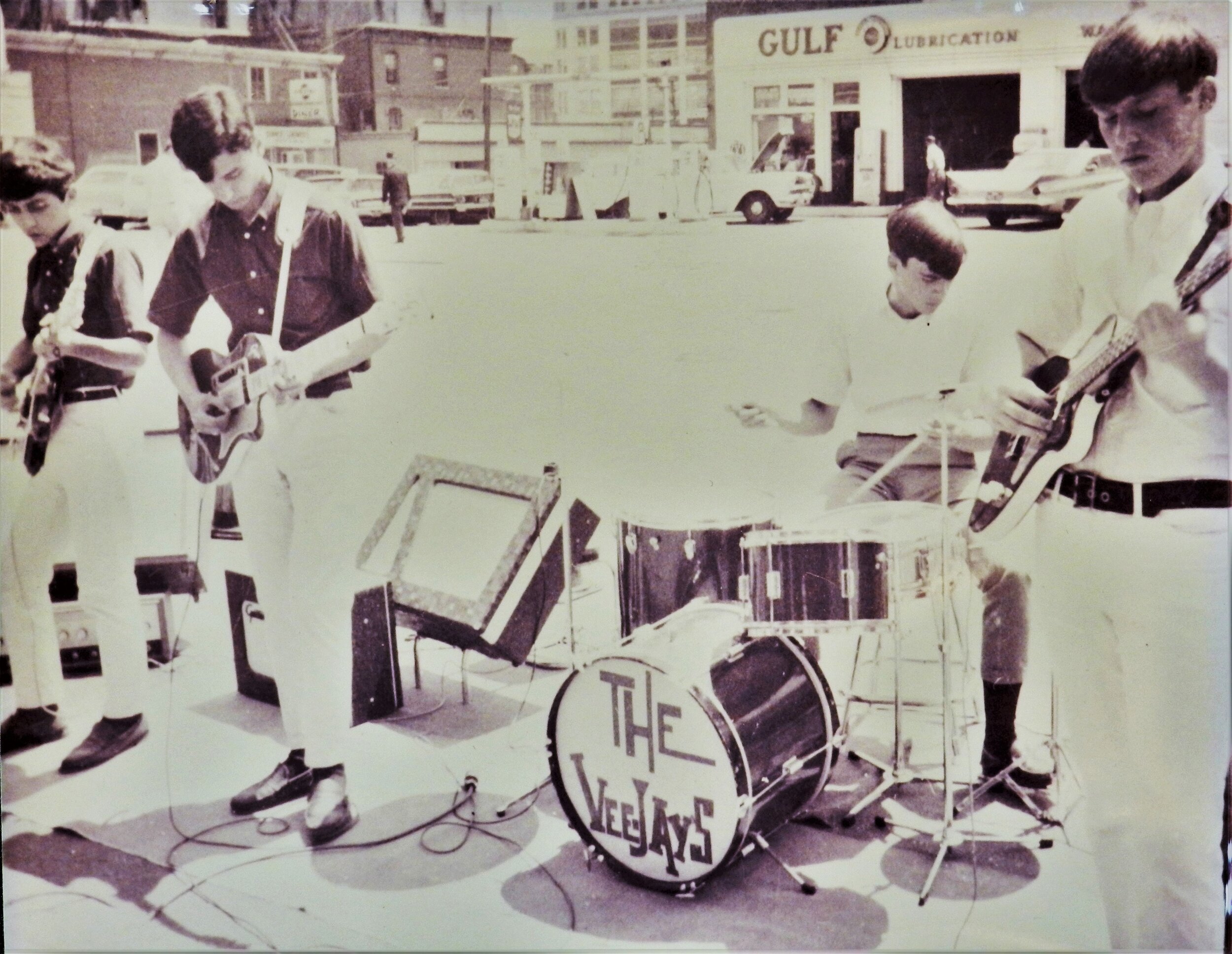
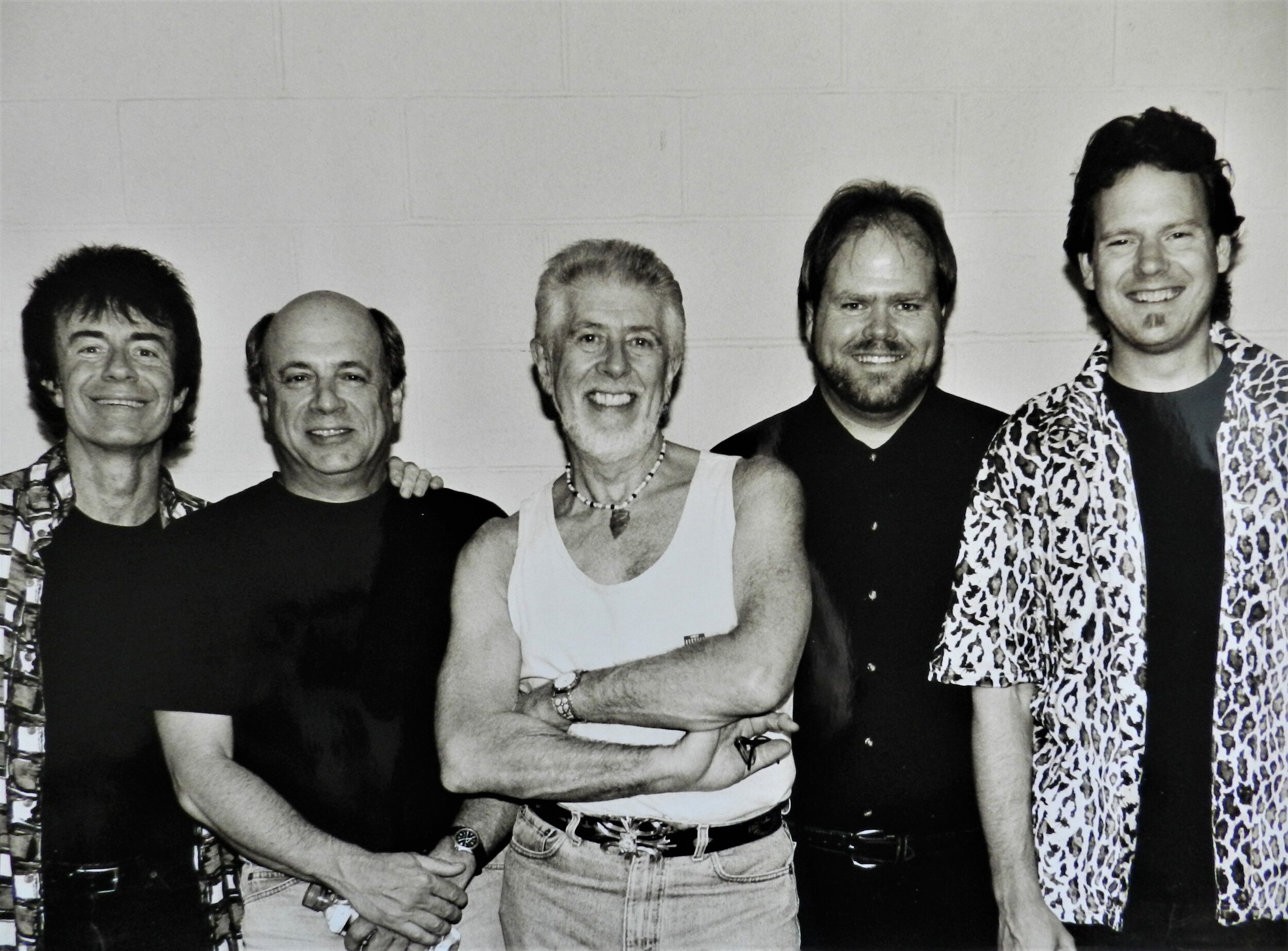
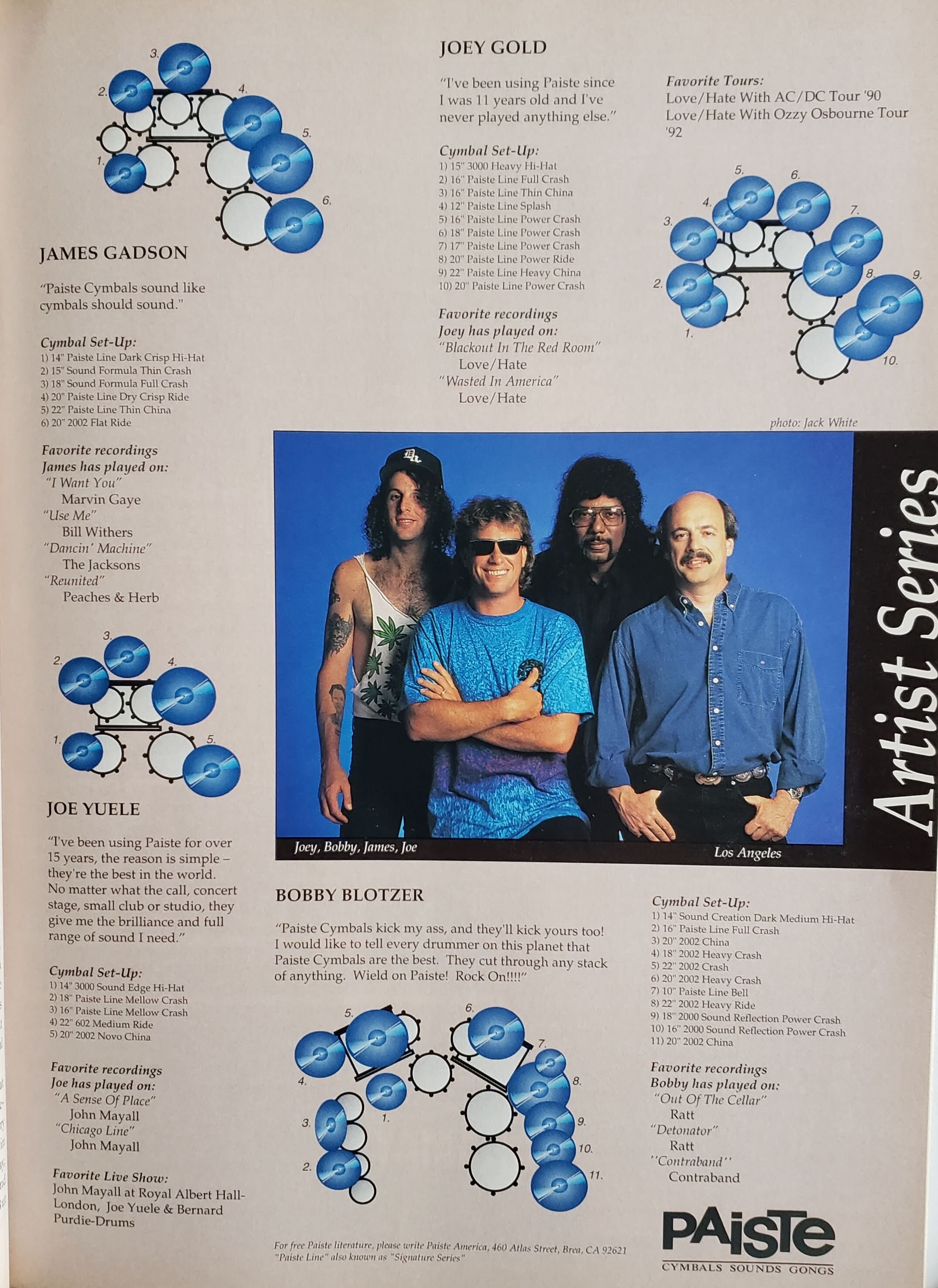
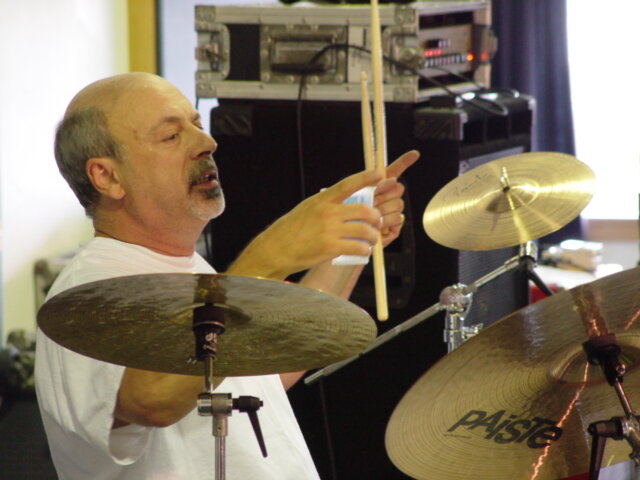
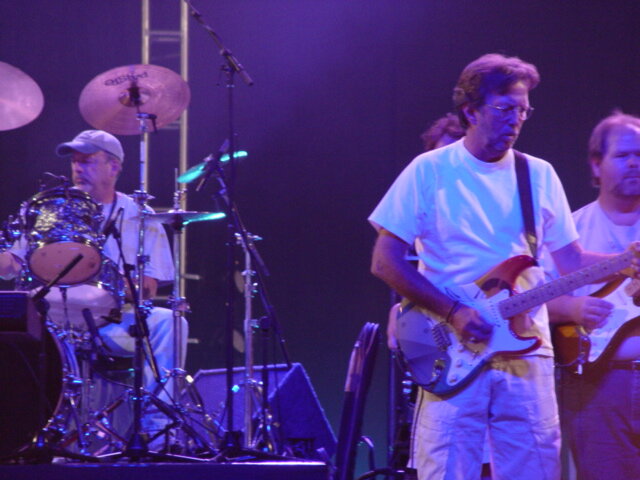
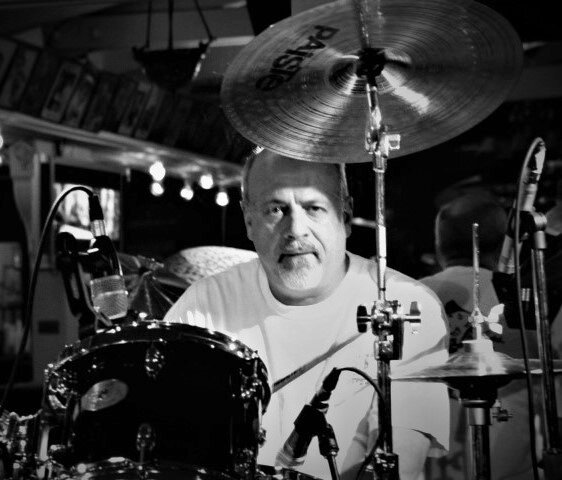
For 25 years Joe Yuele was the driving force behind The Father of British Blues, John Mayall and the Bluesbreakers. But with a 50 year career span that also includes other notable artist such as Buddy Guy, Albert Collins, Dobie Gray, Coco Montoya, and Rick Vito, (to name just a few), there is so much more to Joe's story. I first met Joe in the mid 80s, in Southern California, when he was in between Bluesbreaker tours and playing a local club with guitarist Walter Trout. With him being a New England native, we hit it off right away after I mentioned I had finished 4 years of college in Boston. Since then it has been a steadfast friendship throughout the years. So with this interview, I finally get the chance to ask him those all important questions. Like… What kind of sticks do you use? And... What was that fill you played on bar 84, track 7, from that record back in 1988? Well, actually, as you'll see, there are much more interesting topics to cover. I'm just honored to share Joe's story here with you. His, is one incredible musical journey, from homeless and broke, to world traveler.
Q: Joe, what an amazing 50 year music career you've been blessed with. I guess we should start with a little background on how you got interested in music?
Joe: My father played guitar but was also a bugle instructor in the army during WWII. After the war, he formed what he called a little hillbilly band that played live radio shows with himself on guitar and vocals and my mother and uncle on guitar and vocals as well. So there was always a lot of music around the house. When I was about 13 the local VFW was organizing a new drum corps and I tried out for the drum line. But they already had more drummers then they needed. They were still recruiting horn players though, so I became a bugler (more of a trumpet than bugle, with two valves). I enjoyed playing horn for a couple years and was asked to play Taps for Memorial Day services and other occasions with my father, the instructor, always in attendance. I kept my eye on the drum line, though, for an opening but that never came up. So when I started high school, I joined the high school marching band because they needed a drummer.
Q: The obvious question then, why the drums? What drew you to the drum set if there were other musical options around the house?
Joe: Well, seeing the Gene Krupa story with Sal Mineo had a big impact on me at thirteen years old. I started banging on anything and everything around the house from furniture to pots and pans. The washing machine was my favorite. One time my mother came home from work and found I had taken several of her pots and pans and strung them from the ceiling to simulate cymbals. After that, they knew I was hooked and gave me my first drum set for Christmas. It was a three piece red sparkle Kent set, that I still have.
Q: Krupa's big beat set the bar for the rest of the drumming world for time eternal it seems. Were there any other drummers or musicians that rang that bell for you and made you say, "Man, I really wanna do that”?
Joe: Yes, there were many and still are. I've always loved all styles of music and drumming. I think for me, and most kids back then, the usual suspects for ringing that bell were Gene Krupa and Buddy Rich. And almost anything on the radio turned me on. From Jerry Allison's paradiddle drum groove on Buddy Holly's "Peggy Sue", to Earl Palmer's bass drum intro on Fats Domino's "I'm Walking”. Later on, circa 1965, Joe Morello took the world by storm. I'm thinking about the sound of Joe Morello's kick drum, and God, I love it.
Q. We can all kind of go back to that moment when we got our first group of friends together to jam. You put your first band together at an early age. Did you guys have a style of music in common that you wanted to play?
Joe: Back in I think 1965 The Ventures were hot and that worked out good for us because there were guys around who could play guitar but didn't sing. So we put together a Ventures copy band called The Vee Jays, with myself on drums. I asked my guitar playing friend, Vic Rocco, if he could teach my cousin, Dick Harrigan who didn't play an instrument, how to play the bass. We had just two weeks to get ready for this little gig I booked. Those guys worked their butts off and were ready to play the gig. We eventually added a singer and had a ball playing high school dances, frat parties, and what they called college mixers.
Q: At age 16, you left home and hitch hiked from Massachusetts to Los Angeles? That's a pretty bold move at that age. What was your motivation for jumping out into the big world so young?
Joe: That's a good question and one I've been trying to answer for years. I think when people hear about a juvenile runaway they think about a kid who had a bad childhood. But nothing could be further from the truth for me. I grew up in a loving home with wonderful loving parents who cared for our every need. We four kids had it good at home, and we were proud of our family. So I guess the answer is I just had a wild hair and couldn't wait for the adventure to begin. I stuck out my thumb on May 25, 1967 in Salisbury Beach, MA and landed in Glendale, CA 8 days later on June 1st. I've lived in California ever since. Southern California was the promised land for a kid from New England. It was beach weather year around, with movie and TV stars. Plus the music that was coming from the west coast at that time was all over the radio. I never even considered any where else.
Q: Tell us about L.A. in those first couple years ? Did you know anybody when you got there ? How hard was it to get on your feet and start playing gigs in those days?
Joe: For the first 3 months in L.A. this already skinny kid was losing weight. I was pretty much homeless for the summer of 1967. I knew no one, had no money, and no place to stay. Lucky for me it was the Summer of Love so occasionally I could fall into a hippie crash pad somewhere. But mostly in those early days, I slept in city parks. One day I saw some kids hanging out on a street corner and I introduced myself. They didn't believe it when I told them I was a drummer. So they challenged me to prove it on a set of drums one of them had at his home. When I got to his kit, I was like a wild man. I tore into those drums to the point that a neighbor came knocking on the door. We thought it was a noise complaint. But as it turned out, this nice women wanted to tell me that her theater troupe in Hollywood needed a drummer for the band. The next day I made the audition, got the job, and that job led to another job and to another. For years, I could trace back every gig I had to that audition I did in Hollywood that day in 1967.
Q: And kids don't realize, this was way before cell phones, internet, Facebook, Instagram, Twitter. This was when the music biz was all about, “Hey, I know a guy…”. Word of mouth was the way everybody got gigs back then. Friendships went a long way towards getting those gigs.
Joe: Of course. And I made many friends on the gigs. But I didn't have any deep friendships like I knew back in New England. But then I did a gig with a great guitar player named Robert Stamps. Robert and I became fast friends, and he introduced me to all his buddies that he grew up with in the San Fernando Valley. I mean to tell you, these guys were California natives, and were plugged into every aspect of the west coast music, hot rod, and surf culture scene. When they took me in, I felt I had finally put down roots again for the first time in years.
Q: So I'm guessing, your friend Robert says, “Hey, I know a guy...” and BOOM, John “Juke” Logan comes into your life? ?
Joe: That's right. One of Robert Stamps' buddies was John "Juke" Logan. Juke was a true Hipster. A great musician, songwriter, graphic artist, and was a life long dear friend. He asked me to join his band "The Juke Rhythm" in 1974. Now, the flip side to Juke's deep musical talents was his skills for booking gigs. He kept us working steady for years. From 1974 thru 1977 Juke was THE booking agent on most all the blues shows taking place in L.A. At that time most national touring blues artists didn't carry their own bands. Juke saw the need, loved the music, and set up the shows. We were backing up blues greats like Lowell Folsom, Albert Collins, Margie Evens, Big Mama Thornton, Big Joe Turner and many more. It was like a semester at the College of Blues Knowledge. An amazing turn of fortunes, opportunities, and education for me.
Q: Albert Collins was notorious for being a live wire on stage. Any truth to the rumor that there is a bootleg record of you guys backing him up?
Joe: There is. We backed up Albert many times and recorded some of those shows. I just wish there had been cameras rolling. Anybody who's ever seen "The Master of the Telecaster" play, was probably treated to “the walk” (or the stroll). That's where Albert leaves the stage in the middle of a song and walks though the audience, as far as his guitar cord will let him, while soloing on his Telly. It was always a highlight of Albert's show and the crowd would go nuts. The JRB was playing that night with Albert at the Fox Venice Theater. Albert showed up at the sound check with a giant spool of guitar cord maybe 200 ft long. When we saw that big ole spool we cracked up knowing we were in for a treat. I don't know the capacity of the Fox Venice, maybe 2000 seats, but it was packed that night. Towards the end of the show Albert took the stroll to try out his new cord. He had, like I said, at least 200 ft and he was having a ball walking all through that big crowd. He kept on walking and walking. Meanwhile, we were vamping on a funk groove on the one chord and loving every minute. Albert, like the pied piper with the audience in tow, kept walking on through the entrance of the theater, out into the street, and the entire audience followed him! We were the only ones left inside, still vamping! He stayed out there and finished the show! He never came back inside, nor did the audience! True story...
Q: Another very cool gig came about for you through The Juke Rhythm Band. How did the Dobie Gray tour happen?
Joe: The JRB had a revolving guitar chair after Robert Stamps left. Rick Vito was always first call, when he wasn't touring with John Mayall. Then rounding out the rest of JRB was Larry "Little Race" Counsel, Ernie "Mellow" Corello and James Quill '“Smitty" Smith, another Mayall alumnus. Smitty, who used to work with Dobie Gray, was asked to put a band together for Dobie's upcoming tour. The timing was good for us, so Smitty just plugged the JRB into the Dobie Gray band. We toured with Dobie on and off for about a year & a half. Mostly though the South. One time a few of us were walking with Dobie in downtown Nashville, and people who recognized him from shop windows and restaurants were literally coming out of the woodwork to say hi. Songwriters, record producers, and fans all loved him. He was a great singer and entertainer who deserved more credit then just his big hits “In The Crowd” and “Drift Away”. Dobie and I stayed in touch thru the years, and I always called him when I came to Nashville to play.
Q: Then, 25 years with John Mayall. That's an amazing run for anybody in the music biz. The Father of British Blues. John is credited with showcasing some of England's great blues players to the whole world. How did that gig get started for you?
Joe: I joined the Bluesbreakers in 1985, after a recommendation from Coco Montoya. I was playing drums in the Coco Montoya Band when the drum chair in the Bluesbreakers opened up. Coco, who had been playing guitar with Mayall for about a year, recommended me. The first time I met John, I went to his house in Laurel Canyon and we played in his living room. He hired me that day and I managed to remain his drummer for some 25 years.
Q: 25 years, 15 albums, and 6 DVDs later…. We could probably sit here all day and hear stories. Are there any moments of those years that stand out as just “over the top” moments?
Joe: Well, the fist gig I ever did with John was a live TV show in the former Communist controlled state of Prague, Czechoslovakia. We were one of only two bands from the west, given permission to perform behind the Iron Curtain at that time. The other band was Santana. The Eastern Bloc made an early impression on me. The Punters, the audience as they're called in Europe, were the most appreciative fans I've ever played to. Starved for live music from the west, their enthusiasm was over the top. One time at the end of a show in Pecs, Hungary, I got a bit overwhelmed by the emotional outpouring we were getting and threw a pair of drum sticks into the crowd. The place erupted and hundreds of kids stormed the stage. I went down to greet them and they were all yelling and many were crying and asking for my autograph. I was so happy to be with them and could have stayed all night in their midst. Little did I know, but the KGB were also storming the stage to get a hold of the drummer who was inciting a riot. At that moment the tour managers jumped in and rescued me from what most likely would have been an arrest. True story.
Q: Mayall must be right up there with the hardest working men in show business. 25 years is a long road.
Joe: When it came to touring I never head of anybody who worked harder than John Mayall, with the exception of maybe the late great BB King. When we went out for two weeks we would play 14 shows in a row without a night off. If we went out for 5 or 6 weeks we would play 38 to 45 shows in a row. All one nighters. The longest and most strenuous tour I ever did with John was 59 cities, 18 different countries, all in 60 days. There was one day off on the last week because there was no place left to play. This was all in Europe before the EU was established. So there were border crossing almost every day and that meant we had to get up extra early in order to make the gig. We were in our hotel room on average about 2 hours a night. It was good for making money. And with no days off, no time to spend it. When we got back home I bought my first house.
Q: Probably one of the best representations of Mayall's live show is his 70th birthday concert DVD. He brought back some of the great Bluesbreaker alumni for that concert, that includes Mick Taylor and Eric Clapton. Your drumming on that is just a text book on blues drumming, dynamics, and groove. Can you tell us a little about that experience, and playing with Mick and Eric?
Joe: In 2003 we went to Liverpool, England to play a concert for UNICEF called "The 70th Birthday Concert" featuring Eric and Mick. It was John's 70th birthday and he wanted to go all out. They made a 10 camera DVD shoot and a remote recording CD of the event. There were about 5,000 people in attendance, and that magic, that can only happen on a live gig was also in attendance. I would say that session stood out as a "Wow, totally cool" moment for me. It had been 40 years since John and Eric had played together. So the reunion was a really big deal. We had one rehearsal with Eric in London two days before the gig. I have to admit we all got a little excited when we first walked into the rehearsal studio and saw EC's guitar rig already set up. The rehearsal was fun. Eric was a great hang, totally together, and played great. Two days later Chris Barber, the horn section, and Mick Taylor, all joined us at the sound check in Liverpool for the show.
Q: You ended up doing 15 CDs with John. Any recording studio highlights from those days that stand out for you? And how much preparation did you put into an album project before you went in the studio?
Joe: John would usually record a new album about ever year and a half. But some of those were spur of the moment deals. One time flying to Europe to start a tour, John announced on the plane that we were going to record a new live album. Cool, right? The session would be in Frankfurt. Only problem, Frankfurt was in two days! Another time, we were playing somewhere in east Europe and John handed the house sound guy a small inexpensive cassette player and asked him to push the record button when the show starts. 6 months later, we meet at LAX and much to our surprise, John handed us a copy of our new album. This was the first we had heard of it. The album was called "Behind the Iron Curtain" and was recorded on that little cassette player.
Q: But over the years you guys came up with some great award winning material.
Joe: Thank you. We made a record for Silvertone in 1993 called "Wake up Call". It featured Mavis Staples, Albert Collins, Mick Taylor and Buddy Guy. We received a Grammy nomination for Contemporary Blues Album of the Year for that. And at that time John and Buddy were both signed to Silvertone Records. So it made sense that one of the songs off that album, a Junior Wells tune called "I Could Cry", feature a duet with both of them. We cut that for John's record, but the record company liked it so much they also included it on Buddy Guy's album,"Feels Like Rain". Buddy's album won the Grammy award that year for best contemporary blues album. So yeah, it's nice getting that Grammy nod after we all worked so hard on that project.
Q: I wish we had time to really get into all the discography and performance output of those 25 years. There's just so much to cover!
Joe: There are many memorable moments. I mean, in 2002 the album "Along For The Ride" had an all star cast that included Mick Fleetwood, Garry Moore, Peter Green, Otis Rush, Billy F. Gibbons, Billy Preston and many other great players. And over the years we played the Tonight Show three times. Once with Johnny Carson as host and twice with Jay Leno. The one with Johnny was special, of course, because it was Johnny and that night, unbeknownst to us, Doc Severinsen had tenor sax player Pete Christlieb write horn charts for the two songs we were gonna play. They set up the 6 horn players right next to my drum kit, with Doc Severinsen not two feet away. Doc leans into me and says, “Count it off man”. Now THAT was a cool gig. A career highlight for sure. To be on that "stage" with them cats (Legendary NBC Orchestra) playing them killer Christlieb charts. I had arrived!
Q: What kind of advise would you give a young drummer who finds themselves in a recording/performance situation with that level of talent surrounding them?
Joe: My advice to a young drummer is, be as prepared as you can with regards to the songs you're going to be playing. If you have the material ahead of time, work out parts in advance. Be the first player at the studio so you can comfortably set up your kit to get a sound. If the session goes well everything else will fall into place with regards to hanging with the artist/producer.
Q: For all the vintage drum nerds like me out there, I gotta ask you about your 65 Ludwigs. How did you come across those?
Joe: I bought my 1965 silver sparkle Ludwig Hollywood kit from a private seller in 1978. I talked to the seller over the phone and he told me his parents bought him the drums as a gift new in 1965. He played them for a little while and then parked them in the closet where they stayed for some 13 years until I came along and gladly gave him his asking price of $375.00 for the whole kit. I was so stoked! The drums were in perfect brand new condition! They had never taken the drums out of the house since new. I couldn't believe my luck. I have a few kits that I like to use but my 65 Hollywood kit are still my go to drums for over 40 years now. I could sell everything I own and be OK as long as I still had my 65s.
Q: My favorite vintage drum story of yours, is that 70s Ludwig COB 5x14 snare drum you have. There are guys STILL talking about those reissues.
Joe: I think it was 1973. I mentioned to a drummer friend of mine that I was looking for a new snare drum. The timing was good because he had just bought a new drum and couldn't stop raving about it. "Best sounding drum I ever heard" he said. "Don't waste any time”, he told me. “Get down to the Hollywood Pro Drum Shop before they're all gone". The deal was, Bob Yeager (Professional Drum Shop co founder) told me that he asked Ludwig to make him 25 chrome over brass 5" snare drums. Ludwig said they would, but only if he ordered 50 drums. Bob said, "Well, OK then, I'll take 100”. And that's how those drums came about. I went to the Pro Shop the very next day and as I was walking in the front door, Louis Bellson was walking out with an arm full of charts. I said hello and he asked what I was looking for at the shop. I told him I wanted to get one of those new Brass Ludwig snare drums. He knew what they were and thought it was a very good choice. Out of those 100 drums Bob ordered, there were only two left when I got there. So I bought the next to the last one for $75.00 and it is and always has been, my favorite sounding snare drum. For 40 some years, I've used it on more gigs and recording session than any other snare I have. Some years later I was talking drums with a few guys and someone mentioned that Jeff Porcaro & Vinnie Colaiuta were looking for any of those original Pro Shop brass drums they could find. I stopped taking that snare out on the road years ago for fear it might get muckled.
Q: Muckled? “To grab hold of…. To latch on to”. An expression commonly used in Maine and around the Northeast. Which brings us full circle back to your New England roots. An incredible journey, for sure! And an amazing career success story. A long way from that kid who was California dreamin’.
Joe: I think being a rambunctious kid from a small town, it was probably a good thing I left at an early age. I've thought about how things might have been had I stayed and I think I would have gotten into some kind of trouble. When I got to California I had to support myself. I had to grow up quick. There was no time for trouble. Also, I truly believe I was very lucky along the way. Maybe I had a Guardian Angel. Thanks, Clarence..
Discography with John Mayall & the Bluesbreakers
1985 Behind the Iron Curtain – Crescendo Records
1988 Chicago Line – Island Records
1988 The Power of the Blues – Crescendo Records
1988 Archives to the Eighties – Polydor Records
1990 A Sense of Place – Island Records
1993 Wake Up Call – Silvertone Records
1995 Spinning Coin – Silvertone Records
1997 Blues For The Lost Days – Silvertone Records
1999 Padlock On The Blues with John Lee Hooker – Pyramid / Cleopatra Records
2001 Along For The Ride – Eagle Rock Records
2002 Stories – Eagle Rock Records
2003 No Days Off – Eagle Rock Records
2003 70th Birthday Concert with Eric Clapton & Mick Taylor – Eagle Rock Records
2005 Road Dogs – Eagle Rock Records
2007 In The Palace Of The King with Robin Ford – Eagle Rock Records
D.V.Ds with John Mayall
1987 Live @ Iowa State
1988 Live in Germany
1990 Live from the Bottom line New York
1993 Austin City Limits
2003 70th Birthday Concert with Eric Clapton & Mick Taylor
2004 Cookin Down Under
Discography various artists
1975 Albert Collins & the Angel City Rhythm Band live at the Fox Venice Theater
1993 Buddy Guy: Feels Like Rain (Grammy win for best Contemporary Blues) – Silvertone Records
1994 Coco Montoya: I Got A Mind To Travel – Silvertone Records
1995 John "Juke" Logan: Juke Rhythm – Mocombo Records
2001 Brian “Breeze" Cayolle: State Of My Mind – Konnex Records
2004 Rudy Rotta: Some Of My Favorite Songs – Pepper Cake Records
Compositions (co-writtten with Buddy Whittington)
1999 Always A Brand New Road. Album; “Padlock On The Blues”
2002 Pieces And Parts. Album; “Stories”
2005 Awestruck And Spellbound, Brumwell's Beat. Album; “Road Dogs”
Co-produced Albums
2005 “Road Dogs” John Mayall – Eagle Rock Records
2007 “In The Palace Of The King” John Mayall – Eagle Rock Records
To contact Joe; joeyuele@gmail.com
Jim Klingler has been playing drums for 40 plus years and a graduate of Berklee College of Music. After 15 years of playing in Blues and Country bands on the west coast, Jim now resides in Nashville TN. Jim has been working in Nashville the last 18 years, and touring the last 8 of those with The Andy T Blues Band. During that time the band has toured the US extensively, went twice to Europe and Canada, and have backed up such notable artists that include, Stax legend Steve Cropper, Texas guitar legend Anson Funderburgh, Thunderbirds frontman Kim Wilson, and Grammy winner Bobby Rush. Jim can also be heard on the first 4 Andy T albums, produced by Texas guitar legend Anson Funderburgh, and which features the late great James "Nick" Nixon on vocals, and current singer Alabama Mike.

